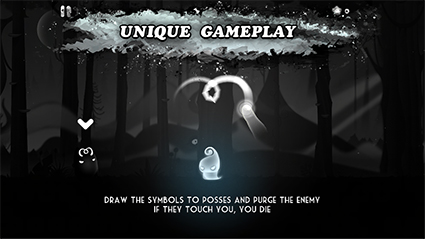MildMania is a Turkey-based, self-funded game studio founded in May 2013 by Burkay Ozdemir and Emre Canbazoglu. Their first title Darklings barely made it in the end of November 2013. Making the game was “especially hard in Turkey, where the gaming industry is very small,” Emre recalls. Darklings is a mobile game with “truthfully” unique gameplay where light meets darkness like in epic tales. You control Lum, the face of light, to beat darkness and bring the light back to the Universe. Emre gives us the tale of making the game and beyond.
The Beginning: A Poster of a Games Incubator
It all started with Burkay seeing a poster of the only known (at the end of 2010) incubation centre focused mainly on games. He gathered two of his local friends to apply there. With that team, we submitted a project called Icons, a social board game totally unrelated to Darklings. That same year, Burkay got accepted to the Game Technologies Master Program, which I was also studying. For our term project, we submitted a game similar to the Harry Potter PC games (where you cast spells by drawing), and the Z-Type HTML5 game (where you write letters to blow up asteroids), with the difference that our game was mobile and perfectly adapted for touch screens.
But before we could go on working on Icons in our first months with the new team at the incubation centre, there were some precautions to take care of. First of all, no one in the team had game development experience other than a couple of educational projects which were far from polished enough to be commercial games. So our team started to work on finding the right tools for the process by joining all our experiences and getting help from friends: professors at the program, fellow game development teams, and industry experts from the incubation center.
Later on, we put the project submitted to the centre on hold, and started working on a draw-to-kill game, since it felt like it could be finished in few months, under a temporary name of Monstiez.
A Break-Up for the Better
The ready prototype of Monstiez drew the attention of Chillingo and the Startup Turkey 2012 event. Our team was selected as one of the 15 best startups in Turkey, and we got a chance to talk to a lot of investors. Everything seemed to be going well. After we started working with Chillingo, we got a lot of advice on how to make the game better, and also changed the style to black and white - since Limbo and Contre Jour became pretty popular, getting sales and awards at that time.
However, after some time, the development process got stuck, because everyone around thought that the game was too monotonous and shallow. As the whole design started to change too frequently, moving forward became frustrating. That and some other things brought the team to the verge of splitting. We weren’t able to work together anymore, and our points of view seemed too different. After long discussions, the team came to a total disagreement, and the break-up was inevitable. The designer decided to leave and take all of his visuals.
However, Burkay and I didn’t give up on the game. We were the ones keeping faith in the idea from the beginning, believing it had the potential of making a huge difference in the market. We tried to learn from our mistakes and not follow the (seemingly) wrong path again. One last time, we started to design the game, thinking everything twice to make sure the new edition was much better.
We found Juan Pablo Casini for art and visual design and David Stanton for music and sound. What is more, we founded MildMania LLC and worked with Contrast8 to create our corporate identity. As a result, decisions were made much faster than before. It was all exhausting, but we were finally enjoying what we were doing, just like in the beginning.
Teamwork is Business, Friendship and a Relationship with Girlfriend/Boyfriend
One big mistake we made was sticking too much to certain people and the number of team members, and believing issues can be solved and we could go on working as the same team without any problems. Since we started with three people, we had the feeling we should still finish the game with three people.
Splitting up is not easy for anyone. But looking back at it now, we see things going much better: from external relationships, connections, important or trivial decisions, and people we have worked with, to satisfaction we get from the results of our work. We understood we could have released the game much sooner and better-planned if we decided to break up and make it with our current designers earlier.
This is how we learned that every company should find out whether they’re able to get along with their partners and work together seamlessly, without making every small thing a problem. Any individual should ask themselves if his/her vision or expectations is the same as his/her partners’. This is not just business or friendship, it’s a bit of both, and very similar to the relationship with your girl/boyfriend. 🙂
How to Protect Your Game From Getting Lost in the AppStore
For nine months, we worked with three designers, one audio designer, and two programmers. Three people in this team were freelancers we had been working with for a long time, which meant a relationship good enough to (if necessary) move in an office together and go on working from scratch: from corporate identity and new names to the game visuals. The main reason behind redesigning was not just the break-up, but ultimately the quality: we saw it needs to be much higher than before. We’ve worked with our team members and other people from the industry to modify and change the game to meet the expectations of AppStore users.
While the cost of eight months of redesigning might seem too much for a casual game, we couldn’t let it get lost in the ocean of thousands of apps after sacrificing so much to the project.
Testing Results May Lead to Complete Redesigning
We believe that we made Darklings more enjoyable by adding a lot of content (environment setups, tactical boss fights, objectives and achievements), customization options, and modifying the gameplay mechanics. Testing involved hundreds of people, including development, design, and business managers throughout the world. We performed all tests using TestFlight and beta test subscriptions that were made available after the teaser was released. We invited all people who showed interest to the game, and also our friends from Turkey, who are both game developers and gamers. Hundreds of people from lots of countries have contributed, and we also added an in-game feedback receiver along with some analytics to get all data possible. Darklings right now is nothing like the game we had been working on for a year and a half. All collected feedback helped us fix a lot of bugs.
For instance, the UI happened not to work well with mobile phones - some buttons were too small, and players got bored from boss fights. So the latter was redesigned from scratch: we made a unique fight for each boss.
Instead of Getting Sucked into a Public Argument, We Tried to Focus on the Product
We planned the launch date for the 27th of November. After such a long time of waiting and development, we just couldn’t wait to see Darklings in the AppStore, and were very excited to get our first app published, to see “Ready For Sale” instead of test builds. 🙂
But publishers were cautious towards us, considering the project too risky because our team split up before the game was published, and there was a blaming campaign held both publicly and privately by our former designer who was utterly speculating twisted stories and unfair things to stain the name of the game and company. We didn’t really react: instead of getting sucked into a public argument, we tried to focus on the product. Being sure that almost all stories from our old designer were lies, we could go to court and fight for our rights, but that would take years to accomplish. So, instead, we focused and got a different reward: the launch day and the day after. Both were amazing! Darklings was featured in US and Canada AppStore! Forum threads were being started by other people, great reviews came from media, and we received tons of support mails we instantly answered. Watching the Darklings spread over the world was a part of our dream, coming true at long last!
The Brand of Darklings Started Building Itself
Unexpectedly, self-publishing brought us to the new seas. Just a week before the game got to the AppStore, we met with Ajay Chadha, the founder of B27, and agreed to join efforts with them. It wasn’t a publishing deal, more like that of business development and marketing for US and Europe. It helped us self-publish the way we wanted.
With additional help from Ajay, we started some really good relationships in the industry, getting recognized for both the quality of our game and our friendship with B27. Our brand started building up by itself. As of now, we’ve made an agreement with Unity Tech Japan and Kakehashi Games for Japanese local publishing, Joygame - for Turkey and MENA publishing, and we’re still negotiating about moving on to the Korean, Chinese, and other markets. We’re also trying to raise some money to grow the team and work on parallel projects without losing quality, and this is where our good relations with investors from the whole world can be useful.
The amount of work has nearly doubled after launch. We’ve discovered that what you do afterwards also matters in making the product successful. A whole different world is there behind the gates of development, and we’re trying to adapt ourselves to it while having a lot of fun.
The business side of the industry, making relations, finding local publishers, giving interviews, getting reviews from press, seeing the game loved by industry veterans, planning the business a year ahead to make the game bigger and stronger – all this is new to us, since we were so focused on development before! Even though the creation process was a total headache, I believe we have proven ourselves that if we managed to enter this industry, we’ll make even better products in the future.
Right now, we are about to announce Season 2 of Darklings, which could actually be Darklings 2. But we decided to make it as an update because the game is only three months old. On the other hand – it’s something different to the core! This means we’re not going to throw this game to the attic, and will make sure that Darklings is fulfilling its potential.
Darklings is now available in the iOS AppStore. It’s going to be released on Google Play, Samsung Apps, Amazon, LeapMotion and for PC & Mac. The MildMania team says they have more surprises in their pocket, including exclusive releases and new titles, which they will announce soon!








